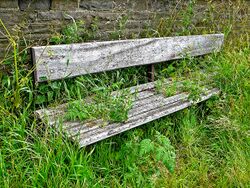Philosophy:Back to nature
From HandWiki
Short description: Lifestyle or philosophy
Back to nature or return to nature is a philosophy or style of living which emphasises closeness to nature, rather than artifice and civilisation. In this, the rustic customs and pastoralism of country life are preferred to urban fashion and sophistication.[1][2][3][4]
At the end of the nineteenth century, a variety of back to nature movements developed in Germany which were collectively known as Lebensreform (life reform). These included naturism and naturopathy.[5]
Notable exponents
- Diogenes and other cynics who advocated the simple, shameless lifestyle of a dog
- Henry David Thoreau, who spent two years living a simple life in a log cabin at Walden Pond
- John Zerzan, an anarcho-primitivist who thinks that symbolic culture such as language is a barrier to the direct experience of nature[6]
- Ted Kaczynski, a mathematician who opposed industrial society as the Unabomber
See also
References
- ↑ Baker, Nick (2017), ReWild: The Art of Returning to Nature, Aurum Press, ISBN 9781781317358
- ↑ Dallmayr, Fred Reinhard (2011), Return to Nature?: An Ecological Counterhistory, University Press of Kentucky, ISBN 9780813134338
- ↑ Schmitt, Peter J. (1990), Back to nature: the Arcadian myth in urban America, Johns Hopkins University Press, ISBN 9780801840135
- ↑ Watson, Robert N. (2011), Back to Nature: The Green and the Real in the Late Renaissance, University of Pennsylvania Press, ISBN 9780812204254
- ↑ Sharma, Avi (22 February 2012), "Wilhelmine nature: natural lifestyle and practical politics in the German Life-reform movement (1890–1914)" (in en), Social History 37 (1): 36–54, doi:10.1080/03071022.2011.651583, ISSN 0307-1022, http://www.tandfonline.com/doi/abs/10.1080/03071022.2011.651583
- ↑ Morris, Brian (2014) (in en), Anthropology and the Human Subject, Trafford Publishing, p. 428, ISBN 978-1-4907-3104-9
 |


